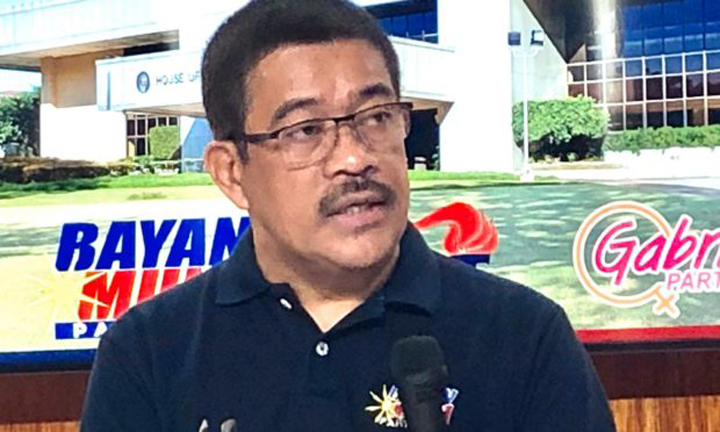
The House Committee on Constitutional Amendments marked Constitution day on Tuesday by adopting proposed amendments to the “restrictive” economic provisions of the 1987 Constitution, but dropped the proposal allowing foreign land ownership.
Voting 64 affirmative, 3 negative and 3 abstentions, Ako Bicol Rep. Alfredo Garbin Jr., the panel chairman, said the members of the committee adopted the Resolution of Both Houses (RBH) No. 2 authored by Speaker Lord Allan Velasco.
The resolution seeks to amend certain economic provisions of the 33-year-old Charter particularly Articles XII (National Economy and Patrimony), XIV (Education, Science, Technology, Arts, Culture and Sports) and XVI (General Provisions).
It seeks to insert the phrase “unless otherwise provided by law” to several sections of the Constitution, which restrict foreign ownership of public utilities, educational institutions, media and advertising. The addition of this phrase will allow Congress to enact laws to free up the economy to foreign investors, or maintain the status quo.
Garbin said these proposed amendments will be limited to the economic provisions in light of the damaging effects of the Covid-19 pandemic to the economy.
“Today February 2 is the Philippine Constitution Day. It marks the 34th year of ratification of the 1987 Constitution. But our Constitution is far from being perfect. We need to open up protectionist provisions to attract foreign investments,” Garbin said.
Speaker Velasco said the country would need to relax its business regulations to make them “more friendly” to foreign investments.
If RBH No. 2 were to be passed in 2021, House Committee on Ways and Means Rep. Joey Salceda projected an increase in foreign direct investments (FDI) of P211.21 billion, a 0.55-percent increase in the country’s gross domestic product, and the potential generation of 422,470 jobs by 2022.
Over a period of 10 years, from 2021 to 2031, the lawmaker from Albay expects an annual average increase of P330.45 billion in FDI, 1.86-percent increase in GDP and 660,897 new jobs.
But Bayan Muna Rep. Carlos Isagani Zarate questioned the timing of Charter change amid the Covid-19 pandemic.
Zarate has expressed concern that the move to change the Charter is being pushed with a political agenda.
“This will be a divisive issue especially 18 months before the elections and they are prioritizing this,” he said.
Instead of changing the Constitution, Zarate said the government should address the country’s No. 1 problem—corruption and bureaucratic red tape.
Zarate also warned that the proposed Charter change would be very disadvantageous to consumers, national minorities and national patrimony, in general.
According to the lawmaker, areas to be potentially opened to full foreign participation and ownership are in the use of land and natural resources, use of marine wealth, control of public utilities, mass media and advertising, and educational institutions, among others.
The process
Meanwhile, the resolution will now be transmitted to the plenary for another round of deliberations.
RBH No. 2 seeks to amend the Constitution by exercising the powers of Congress as a constituent assembly, consistent with Article XVII, Section 1 of the Constitution, which states that any amendment to the Constitution may be proposed by Congress upon a vote of three-fourths of all its members.
According to the lower chamber, the House does not need to make any formal act in order to convene itself into a Constituent Assembly, saying “there is no need for a prior act convening Congress into a Constituent Assembly as Congress is already considered a constituent assembly.”
Also, it said the two bodies can tackle proposed amendments to the Constitution separately in the exercise of their constituent functions. The two chambers vote on these proposed amendments separately.
The chamber said since the procedure that governs deliberations involving amendments to the Constitution is the same as that for the enactment of bills, it follows that the requirements and limitations on bills also apply. This includes the limitation on the subject matter of a bill; subjects foreign and unrelated to the subject matter of RBH No. 2 may not be introduced at any stage of its deliberations.
In tackling proposals to amend the Constitution, the lower house said both Houses of Congress shall act in the same manner as when they enact legislation. RBH No. 2, like other House bills, will undergo first, second, and third readings.
It said the main difference between proposals to amend the Constitution and the passage of legislative measures is that the resolution proposing amendments to the Constitution must be approved by at least three-fourths of all House members before it is transmitted to the Senate for its concurrence.
The House said should the Senate propose amendments to the House version of RBH No. 2, and both versions are substantially the same, the House may concur with the Senate amendments to the House version, or choose to adopt the Senate version of RBH No. 2.
If the House does not concur with proposed Senate amendments to RBH No. 2, or in cases wherein the Senate has introduced its own version of RBH No. 2, and the said measures have conflicting provisions, the differences may be settled by a bicameral conference committee composed of representatives from both chambers, the chamber added.
Once both Houses approve the resolution, Congress shall pass another resolution or bill setting the date of the plebiscite for the ratification of the proposed amendments. The date of the plebiscite shall not be earlier than 60 days nor later than 90 days after the approval of the said amendment or revision.
The proposed amendments to the Constitution can then be ratified in this plebiscite via a majority vote of the electorate.
Speaker Velasco earlier said Congress is eyeing to present to the public for ratification the amendments to the economic provisions of 1987 Constitution alongside the national elections in 2022.
